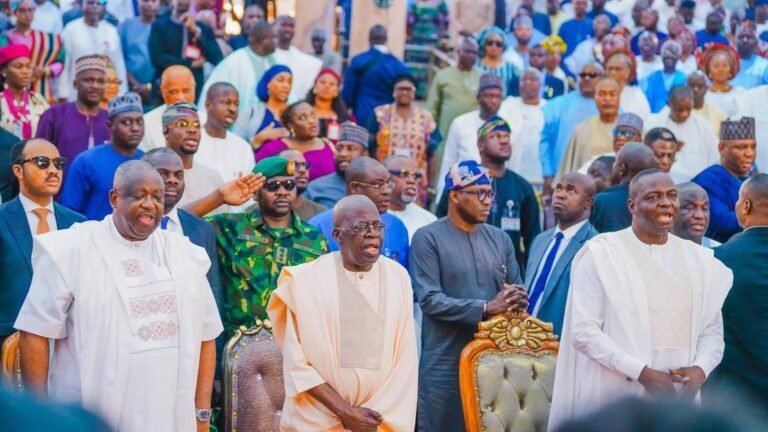WHEN President Bola Ahmed Tinubu touched down in Jos, Plateau State, on Saturday, it was meant to be a moment of solemnity and symbolism, a visit that blended condolences with outreach.
The President attended the funeral of Nana Lydia Yilwatda, mother of the APC National Chairman, Professor Nentawe Yilwatda, and met with Northern Christian leaders to reaffirm his commitment to unity, fairness, and peace.
But even before the echoes of his message faded, political fault lines had deepened.
Former Vice President Atiku Abubakar swiftly denounced the visit as a “mockery of leadership,” accusing the President of ignoring victims of insecurity across the North.
The conflicting interpretations of Tinubu’s trip have now sparked a heated debate over empathy, optics, and political sincerity. News Point Nigeria explores the politics, the perception, and the public pulse behind the Jos visit.
According to the official State House statement, President Tinubu told church leaders at the COCIN headquarters that his administration was committed to equity, fairness, and religious harmony.
“I have a mission to unite this country and ensure its prosperity,” he declared.
He cited his own interfaith family, a Muslim married to a Christian pastor as evidence of his personal conviction in Nigeria’s religious diversity.
Tinubu also reassured Nigerians that his government was winning the war against insecurity, particularly banditry and terrorism in the North, and vowed to “defeat the enemies of peace.”
The visit to Jos, the statement emphasized, was not just political, but personal, a tribute to a “devoted mother and humanitarian,” as Tinubu described the late Nana Lydia Yilwatda.
For the APC and its supporters, it was a moment of faith and fraternity, showcasing a president reaching out to Northern Christians amid lingering perceptions of religious bias.
Yet, for opposition leader Atiku Abubakar, Tinubu’s appearance in Jos was tone-deaf and insensitive.
In a scathing statement personally signed by the Ex-vice president, Atiku accused the President of “mocking the pain” of ordinary Nigerians by visiting a state “still burying its dead” not to console victims of violence, but to attend a “political funeral.”
“It is a sad reflection of priorities that while families in Plateau continue to bury their loved ones, President Tinubu chose to celebrate with his party elites,” Atiku wrote.
He likened the visit to the President’s previous trip to Benue, where he “never set foot in Yelewata, the epicentre of the massacre.”
Atiku’s criticism underscores a broader political argument: that Tinubu’s administration is disconnected from the suffering of ordinary Nigerians, particularly in conflict-ridden regions of the North-Central.
At the heart of the controversy lies a contest of narratives, one projecting Tinubu as a bridge-builder, and the other painting him as an out-of-touch politician.
Both perspectives carry political weight.
For a lot of Nigerians, the Jos trip symbolized religious inclusion and national unity, reaffirming Tinubu’s repeated mantra of “Renewed Hope.”
A lecturer of Political Science at Bauchi University, Professor Ibrahim Sani, told News Point Nigeria that President Tinubu’s visit to Jos was both timely and deeply symbolic, given the prevailing climate of insecurity, ethnic tension, and social unease in Plateau State.
According to him, “The President did the right thing. His visit came at a most appropriate moment when the state and indeed the entire North Central region are yearning for reassurance and healing. The Jos trip, in my view, was not only politically significant but also morally uplifting.”
Professor Sani further commended the President’s speech, describing it as heartfelt, inclusive, and statesmanlike, one that “portrayed love, compassion, and a genuine commitment to peace and unity from a leader who truly cares about the people.”
He added that Tinubu’s message struck a chord of reconciliation and hope, and reflected the posture of a President seeking to bridge divisions and restore trust among Nigeria’s diverse communities.
But to other fierce critics, the visit was nothing more than a public relations spectacle, a carefully choreographed display of empathy that, in their view, projected compassion without truly practicing it.
A political analyst based in Niger State, Benjamin Malam, told News Point Nigeria that while President Tinubu’s appearance in Jos was cloaked in the language of unity and sympathy, it came at a time when the North Central region remains gripped by waves of insecurity, deadly communal clashes, and deep-seated public frustration.
According to Malam, the visit, though presented as humanitarian and reconciliatory, unfolded against the backdrop of rising violence and government inertia in Plateau, Benue, and Niger States, regions where many Nigerians have long accused the federal govt of neglect, selective attention, and muted compassion.
“This timing,” he explained, “may have unintentionally intensified public resentment, giving the opposition an easy opportunity to portray the trip as tone-deaf and politically self-serving, rather than a genuine gesture of solidarity.”
Malam further cautioned that for the President’s message of unity to resonate, it must be matched by presence and action in all corners of the troubled North Central zone.
“The President should also visit Niger, Kwara, and Benue,” he urged, emphasizing that “leadership, especially in times of national pain, is best demonstrated not just in words, but in compassionate visibility and responsive governance.”
As the debate on the Presidential Jos visit goes on, one thing is sure, both leaders, Tinubu and Atiku understand the power of public symbolism.
While Tinubu sought to project unity through faith and fairness, Atiku used the same event to underscore what he sees as the APC government’s moral failure.
In a country fractured along religious and regional lines, their clash reveals the deeper struggle for the moral high ground in Nigerian politics, one that goes beyond rhetoric, into the very soul of leadership itself.
As Nigeria watches both men spar over compassion and credibility, one question remains: Will Nigerians remember Tinubu’s message of unity, or Atiku’s message of neglect?







